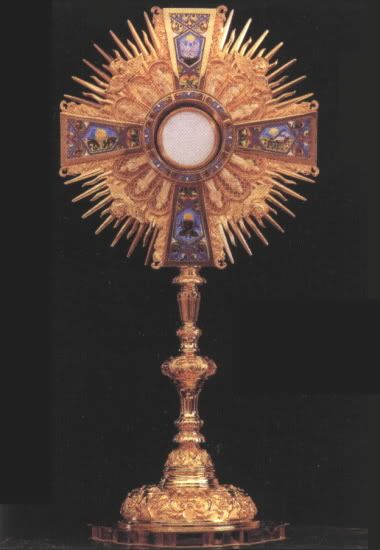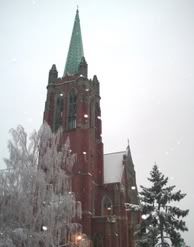Containing within itself all sweetness, alleluia.

Today is Corpus Christi (Latin for the "Body of Christ"), a feast commemorating the institution of the Holy Eucharist. It occurs on the first Thursday following Trinity Sunday and mirrors Holy Thursday when the Last Supper took place. Corpus Christi is a solemnity in the Roman Catholic Church (observed on the following Sunday in the United States), but is also celebrated officially and unofficially throughout the Anglican Communion. In some Catholic countries it is a national holiday and a traditional time to perform cycles of mystery plays.
The appearance of Corpus Christi as a feast in the Christian calendar was primarily due to the petitions of the 13th century Augustinian nun Saint Juliana of Liège. From her youth she claimed that God had been instructing her to establish a feast day for the Eucharist and later in life petitioned the learned Dominican Hugh of St-Cher, Jacques Pantaléon (Archdeacon of Liège and later Pope Urban IV) and Robert de Thorete, Prince-Bishop of Liège. At that time bishops could order feasts in their dioceses, so in 1246 Bishop Robert convened a synod and ordered a celebration of Corpus Christi to be held each year thereafter. The celebration of Corpus Christi only became widespread after both Juliana and Bishop Robert had died. In 1264, Jacques Pantaléon, now Pope Urban IV, issued the papal bull Transiturus in which Corpus Christi was made a feast day for the whole Latin Church. New propers for the celebration were written by St Thomas Aquinas.
In high school, I would go to Blessed Sacrament Church in Seattle (pictured below) on their titular feast. At that time, they would have a Dominican Latin Mass at 8am followed by a procession of the Blessed Sacrament through the neighborhood, returning to the church for Benediction. They have just completed a restoration project, most importantly removing the whitewash paint from the brick interior walls of the church.

The closing paragraphs of the Windsor Statement on the Eucharist (1971) of the Anglican-Roman Catholic International Commission state:
11. The Lord who thus comes to his people in the power of the Holy Spirit is the Lord of glory. In the Eucharistic celebration we anticipate the joys of the age to come. By the transforming action of the Spirit of God, earthly bread and wine become the heavenly manna and the new wine, the eschatological banquet for the new man: elements of the first creation become pledges and first fruits of the new heaven and the new earth.
12. We believe that we have reached substantial agreement on the doctrine of the Eucharist. Although we are all conditioned by the traditional ways in which we have expressed and practised our Eucharistic faith, we are convinced that if there are any remaining points of disagreement they can be resolved on the principles here established. We acknowledge a variety of theological approaches within both our communions. But we have seen it as our task to find a way of advancing together beyond the doctrinal disagreements of the past. It is our hope that in view of the agreement which we have reached on Eucharistic faith, this doctrine will no longer constitute an obstacle to the unity we seek.

What a joy it was to welcome you to our Corpus Christi Mass and Benediction! Teven (the thurifer) remembered you well from the St. Michael's conference and was proud to be able to "show his stuff!"
ReplyDeleteYour Vacation Bible School looks great! Ours was this week as well (In the evenings which is why I had a day mass for Corpus Christi) We did a program I developed called "And I mean to be One, too: Stories of Young Saints for Young Catholics" For Corpus Christ, the saints were (natrually!) the child saints of the Eucharist, Imelda and Stanislaus Kostka!